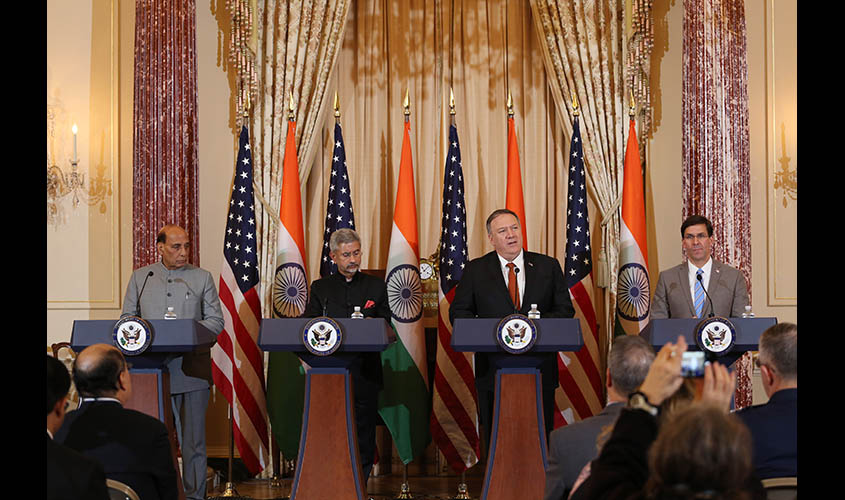New Delhi: After several roadblocks, Minister of External Affairs S. Jaishankar has been successful in untangling the knot of Iran’s Chabahar project, which is crucial for India in strategic terms. This, apart from the energy security issue, is the reason why India is focused on ensuring peace and stability in the Middle East in the wake of heightened tensions between Iran and the United States.
India has secured a written assurance from the US to exempt this port from sanctions during the second 2+2 Ministerial Dialogue between India and US in December 2019. In fact, soon after the dialogue in Washington, Jaishankar visited Teheran and informed Iran’s Foreign Minister Mohammad Javed Zarif that it had got written assurance from the US exempting the Shahid Baheshti Port at Chabahar from sanctions.
India and Iran also “recognised that the port has the potential to act as a gateway between the Indian subcontinent, Iran, Afghanistan, Central Asia and Europe”. Both countries also “welcomed the utilisation of the port for exports from Afghanistan and discussed ways to promote it”. Zarif is coming to New Delhi next week.
India, it is to be noted, had been unable to place orders for equipment for the project for a long time, given the US had imposed sanctions on Iran in November 2018. Though US had given verbal assurance, no bank was in a position of sanctioning a letter of credit for the purchase in the absence of a written assurance. The written assurance from the US, say sources, will pave the way for companies investing in the project.
Chabahar port is located on Iran’s southeastern coast. India is developing this port to secure connectivity to Afghanistan and Central Asia, bypassing Pakistan. The delay in the implementation of the project has made Iran impatient, and it had started a strategic alliance with China.
Iranian ambassador to India, Ali Chegeni, told a news agency this week that the Chabahar project was on course. “The Chabahar port is a symbol of very good friendship between India, Iran and Afghanistan, Commonwealth of Independent States, Europe and the whole Persian Gulf. It does not belong only to Iran and India. Chabahar will go on, don’t worry about it,” he said.
“We are not looking for war. We are living in this region peacefully with our brothers and sisters, including India. We don’t want any tension/escalation in this region,” Chegeni said.
However, the growing tension between the US and Iran has raised fears about the project. Asked to comment on the possible impact on the project due to the growing tensions, Ministry of External Affairs (MEA) spokesperson Raveesh Kumar said: “I think we will have to see. In the past, the US has shown understanding of the importance of the Chabahar project to us and for continued connectivity to Afghanistan. It is very much important in terms of providing economic assistance to Afghanistan and you must have seen in the last several months, the two-way traffic between India and Chabahar port has picked up. We appreciate the understanding of the US. How the whole thing is going to impact (Chabahar) is hypothetical. We will have to see. But we do appreciate the understanding shown by the US in exempting Chabahar port from sanctions.”
On the growing tension between Iran and US, Kumar said: “India has articulated its stand that peace, security and stability in the region are of utmost importance. We have important interests in the region and we would like the situation to de-escalate as quickly as possible. We are talking to several stakeholders who are in the region. Our External Affairs Minister has spoken to the players in the region. He has spoken to the Foreign Ministers of Iran, UAE, Oman, Qatar, and Jordan. He also had discussions with his counterpart from the US and exchanged perspectives on the situation. We are monitoring the situation and we will see how it develops in the next few days.”
Zarif is scheduled to address the Raisina Dialogue, which gathers strategic analysts, foreign and defence policy planners including ministers from different countries. The three-day event is co-hosted by the MEA and the New Delhi-based Observer Research Foundation (ORF). MEA officials said Zarif’s programme stands, despite tension in his country following last week’s killing of Iranian Quds Force Commander Qassem Soleimani.
India, as part of its efforts to bring peace in the region, has also offered to mediate, which has been welcomed by Iran. “India usually plays a very good role in maintaining peace in the world. India belongs to this region. We welcome all initiatives from all countries, especially India as a good friend for us, to not allow escalation of tensions,” Chegeni told reporters in New Delhi.

